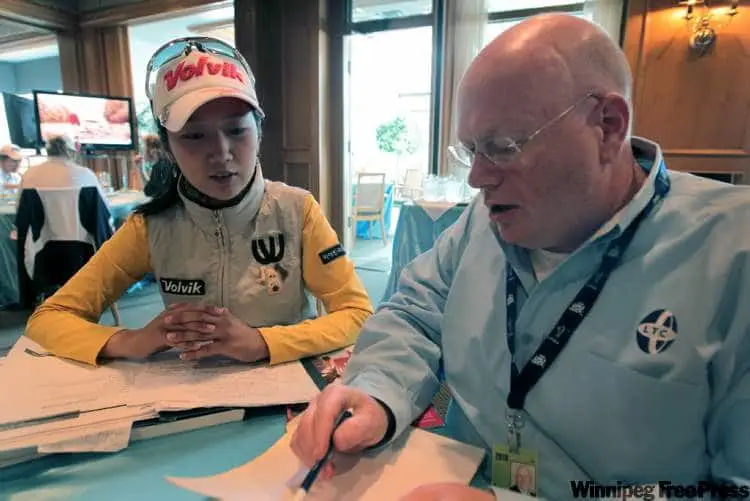There was a time not long ago when Kyeong Bae’s English tutor was an animated character who lived under the sea. Or a mouse who wears pants.
“Cartoons,” she said, “like Spongie Bob.”
To the connoisseur, that would be SpongeBob SquarePants. Bae also found a language mentor in Disney movies, while she sat in hotel rooms on her idle hours during her early days as an LPGA regular.
That was five years ago, when Bae, now 25, was a young South Korean on the Tour, which in the last few years has gone from reactionary to proactive in response to the dramatic shift in player demographics.
A faction of the old LPGA feared the influx of Korean players at the turn of the century, prompting the infamous quote from 16-time winner Jan Stephenson in 2003 that “Asians are killing the Tour.”
How times have changed. These days, language instructors hired in May now travel with the Tour, offering one-on-one instruction for all players, including North Americans who might be interested in, ironically, learning Japanese and Korean given the global direction of the LPGA’s brave new world.
Indeed, that might be the future LPGA, which now has a whopping 45 South Korean players and tour stops in Malaysia, Korea, Thailand, Singapore and Japan.
For now, however, around 15 Tour regulars meet once a week with language instructors from the Indianapolis-based Language Training Center. The goal is rather simple: Without English skills, players can’t communicate with sponsors, media, fans — even their own caddies. That’s a hazard waiting to happen.
“I think they see that their clubs do the talking when they’re playing,” said LTC president Martin George, taking a break from a session with Bae at the St. Charles Country Club restaurant Tuesday. “But they want to be able to talk to fans. They want to be able to talk to the media. They want to talk to sponsors. So sometimes if we’re learning a new language we don’t feel comfortable or confident. I think a lot of them have a lot of good language skills inside. We have to have them get more confident and more excited about being outgoing.”
Take I.K. Kim, a 22-year-old who first arrived in North America from Korea six years ago. Kim knows how to converse casually in English, but it appears perfectionism isn’t confined to the links.
“I learn things, like I say ‘you know’ too much,” Kim said. “Because I do a lot of interviews and it helps me a lot. For me, it’s easy to talk to someone that I know. But on the camera… you’ve got to practice it.”
How important are language skills? According to Bae, almost as important as hitting instructions on the practice range.
So important, she said, that using interpreters (provided by the LPGA) is just spinning wheels. “It’s not helping myself,” Bae reasoned. “I wanted to speak more specific English, more difficult parts. I need to study.
“To hit the ball is really important,” she added. “But I have to communicate better with the caddy. I want to be able to just say something. (Now) I have to translate the Korean to English (in her head).”
Bottom line: Professional golf is a business, and a shrinking business in a recession-ravaged economy. Further, the LPGA relies heavily on pro-am revenue, such as Wednesday’s $10,000-per-foursome event at St. Charles on the eve of this week’s CN Women’s Canadian Open.
So communication is paramount. As one Tour official noted, “Football players don’t have to charm sponsors.”
In fact, it’s getting to the point these days where LPGA’s manager of international development, Korean-born Sean Pyun, had to interpret for certain players up to 15 times two years ago. Now there’s no need, but for rare occasions.
“Certainly, the LPGA is quite different from when I started two years ago,” Pyun said. “When they (Asian players) first got here, they were shy. They couldn’t say anything. Now you see them and they’re joking around with their pro-am partners, giving them lessons. Is their English perfect? No it’s not, but progress has been made.
“A lot more people understand that the nature of women’s golf has changed over time. Whether we like it or not we’re going to go to many different countries in the future. We’ll be more global. I think everybody recognizes that and understands they have to go with the flow. This is where the game’s going to be.”
For example, Pyun said one American Tour player has already expressed interest in learning Japanese or Korean.
“The word it getting out (about the language training) to the players,” Pyun said. “Now they’re asking about it. There’s a lot of incentives from an individual standpoint to relate to a different culture to speak another language. Maybe get a Japanese sponsor interested.”
My, how times can change. In fairness, Jan Stephensen might never have envisioned a day where Asian-born players not only wouldn’t require interpreters for casual conversation, but that North Americans players might actually consider learning Korean. Or that a tournament played in Winnipeg, as LPGA commissioner Mike Whan noted on Tuesday, would be broadcast “and somebody in Korea, Taiwan, Australia, Japan is going to watch it on TV.”
That’s a global shift that isn’t going anywhere but East, even as the Tour remains rooted in the U.S. Clearly, pressure is bound to shift on North Americans to do exactly what Stephensen once demanded of Asian players.
Still, Bae insists that “this is the American LPGA Tour, not the KLPGA (Korean Tour). When I go Roma, follow Roma rules.”
A Korean sitting in Canada summoning an ancient Italian adage in a discussion about Asian golfers coming to America.
Sounds about right.


